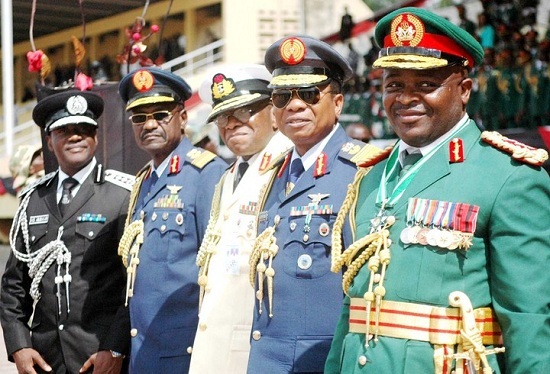Reports have emerged on how the plan to have an amnesty deal for Boko Haram was reached, with sources saying that the meeting between President Goodluck Jonathan and his security chiefs at which the deal was agreed upon was one of the longest in recent times.
The plan is also said to have caused a sharp division in the Jonathan administration, with his ministers backing it while the security chiefs in staunch opposition.
The support for the amnesty deal from the ministers was based upon the fact that it would portray the President as being sensitive to the agitations of the people, especially some highly-placed Nigerians who have expressed support for the deal, contrary to what his critics have been saying about him.
A source said, “The meeting lasted over three hours because of the sensitivity of the security matter under focus and, perhaps, more importantly, because of the disagreement the service chiefs and other security chiefs expressed. The position of the service chiefs was based on the danger of adopting the amnesty option when the Boko Haram sect members remain unknown.
“They also cited the recent dialogue proposed by some of the sect members, but which was dismissed by another faction and faulted the argument of those that are comparing the sect to the Niger-Delta militants, calling attention to the religious colouration of the sect. Their position was made known by the Chief of Defence Staff.”
The source added that a minister pointed out the danger of policy inconsistency on the part of the Federal Government, while also telling the meeting that it was dangerous to ignore highly-placed Nigerians like former Head of State, General Abdulsalami Abubakar, who recently said in London that the government should consider granting the Boko Haram sect amnesty as that was the only option it had at the moment.
The meeting was also said to have done a review on the use of force in fighting the sect and the successes recorded so far, and came to the conclusion that they were “a reaction to the military onslaught in Mali where Muslim extremists were at the receiving end of the action.”
While President Jonathan urged his security chiefs to accept the amnesty option, he conceded that it was not necessarily with a condition to drop the force option, “because not all of them would accept the amnesty and then, we would be justified and those that are calling for amnesty would then have been proved wrong.”
Furthermore, members of the council who were in favour of amnesty argued that it would win more support for the president as the 2015 election year draws nearer.
However, President Jonathan, at a point, was said to have told the Security Council that the security of every Nigerian was more important to him than the second term mandate which one of the ministers reportedly kept referring to.
He was said to have expressed disappointment in those calling for amnesty for Boko Haram “without doing anything tangible to call the sect members to order.” He was also quoted to have referred to some political elite in the country who were allegedly using the terrorist attacks to ridicule the government.
As a result of the meeting, the Chief of Air Staff, Air Marshal Alex Sabundu Badeh, was reportedly prevented from travelling to Bayelsa on that Thursday. He was to go for a medical outreach tagged, EXERCISE EBIYE RIN, the civil-military operations exercise organised by Mobility Command.
One of the security chiefs disclosed that they were not happy with the loss of lives occurring on a daily basis, the government should consider the political option of amnestysince it was not a religious or ethnic crisis.
The security chiefs expressed the belief most of the highly placed Northerners knew the actual members of the sect and once amnesty was granted, they would start talking to them to lay down their arms and come for dialogue.
The committee that was set up at the meeting, headed by the National Security Adviser, Col. Sambo Dasuki (rtd) is to recommend to the government whether amnesty was appropriate for the Boko Haram sect or not; and if yes, provide the modality to be adopted. They are to submit their report in two weeks.
The meeting, presided over by the President and the Commander-in-Chief was attended by the National Security Adviser (NSA), Sambo Dasuki; the Chief of Defence Staff, Admiral S. Ola Ibrahim; the Chief of Army Staff, Lieutenant-General Azubuike Ihejirika; Chief of Air Staff, Air Marshal Badeh; Chief of Naval Staff, Vice Admiral Dele Ezeoba; the Inspector General of Police, Mr Mohammed Abubakar; the Director General of the State Security Service (SSS), Ekpenyong Ita; Director, Military Intelligent (DMI), Brigadier- General Lekam Wiwa; and Director-General, National Intelligence Agency (NIA), Olaniyi Oladeji.
Others were Chief of Defence Intelligence, Major General S. Y. Audu; Minister of State for Defence, Chief (Mrs) Olusola Obada; Minister of Interior, Abba Moro; and Minister of Police Affairs, Navy Captain Caleb Olubolade.




 Premier League
Premier League